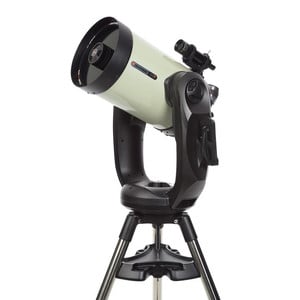Product series:

Celestron designates its Schmidt-Cassegrain optics with integrated coma corrector as EdgeHD. This optical system delivers sharp images right to the edge of the field of view. This is not only noticeable with visual observation, but especially with astrophotography with large sensors, for example with a single-lens reflex camera.
The altazimuth CPC mount is a very stable basis for the optics built into the fork. The CPC mount is equipped with computer control and a GPS receiver.
EdgeHD Optics

EdgeHD optics combine the compact design of a Schmidt-Cassegrain with a noticeably improved image at its edges. This optical system produces completely undistorted, sharp images right to the edge of the large visual and photographic field of view.
Not only off-axis star coma is corrected this way, but also field curvature! No additional corrector is required as an accessory for astrophotography. This puts the higher price of the EdgeHD in perspective when compared to classic SC optics.
StarBright XLT

A very important factor in evaluating the performance of telescopes is transmission, that is the proportion of incident light that arrives at the image plane.
The main characteristics of the StarBright®-XLT coating are as follows:
- Highly reflective multi-layer mirror coating: the mirror coatings consist of precisely applied layers of aluminium, quartz, titanium dioxide and more quartz. The reflectivity is constant across the spectrum, and the three layers of coating provide excellent protection against the ageing of the mirror surface.
- Corrector plate: crystal-clear glass instead of soda lime glass is used for the corrector plate in all Celestron Schmidt-Cassegrain optics with StarBright-XLT coating. Uncoated, this glass delivers approximately 90.5% transmission. Together with the StarBright®-XLT coating, its transmission reaches 97.4%!
The entire optical system consisting the corrector plate, mirror and lenses achieve a transmission maximum of 89% at 520 nanometres (where the dark-adjusted human eye has its highest light sensitivity). The average transmission over the entire visual spectrum from 400 to 750 nanometres is 83.5%.
PWI Telescope Control Software

The software was developed together with PlaneWave Instruments and enables a highly accurate GoTo control. The PointXP Mount Modelling, which is also used in the Celestron StarSense module, is used for this purpose, and allows a much more accurate model of the sky than the electronics of a hand control box. Various reference stars are used to compensate for numerous types of alignment errors, including telescope flexing.
Besides the higher accuracy, control via a PC/laptop combined with the stored star chart is particularly simple and intuitive. In addition, the PWI software has a larger object database than the manual control. If you have Internet access, PWI can even access the SIMBAD professional astronomical database.
The PC/laptop is connected via USB 2.0. The PWI software runs on Windows 7, 8, and 10.
SkyAlign

Simply enter the date, time and location into the hand-held controller (GPS models determine this information automatically), and point at three bright stars of your choice. You don’t even need to know the names of the stars, and you can even choose bright planets or the Moon. The NexStar computer system identifies these stars and correctly aligns the telescope.
The NexStar controller also allows other alignment procedures, such as using just one star - however you need to know its name - or a single planet.
All these procedures are not only very easy for a beginner to master, they also allow the control to be set-up at dusk, when even experienced astronomers may not be able to name the first stars with confidence.

